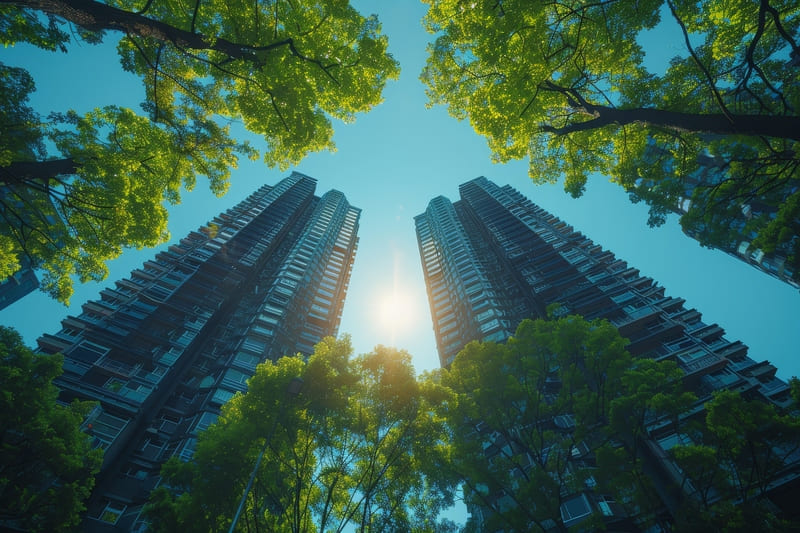This opinion piece breaks down how the concept of green buildings can offer a pathway to promote a healthier and more sustainable future.
Green buildings, an inevitable trend in future architectural development, are designed and constructed based on sustainable development principles. They are crucial for economic transformation as buildings are currently the largest energy consumers and greenhouse gas generators. This issue is particularly relevant in Indonesia, a developing country with a rapidly growing population and increasing construction activities.
The core concepts of modern green buildings revolve around energy conservation and emission reduction, resource recycling, and environmental protection. In Indonesia, the push for green buildings aligns with national policies aimed at sustainable development and climate change mitigation. In fact, the government has introduced various initiatives and regulations to encourage green building practices, though challenges remain in their widespread adoption. These policies often mirror international standards like Leadership in Energy and Environmental Design (LEED), a widely recognised green building evaluation system. Such certifications provide a framework for assessing and promoting sustainable building practices, ensuring that new constructions and renovations contribute positively to environmental goals.
The integration of intelligent technologies is a significant aspect of modern green buildings. This involves using artificial intelligence (AI) and the Internet of Things (IoT) to enhance building performance across its life cycle. In Indonesia, where energy demand is steadily rising, such technologies can help optimise energy consumption in buildings, reducing the strain on national energy grids and lowering operational costs.
The life cycle of a building encompasses various stages: design, materials, construction, renewal and management, and damage. Each stage presents opportunities for incorporating green and smart technologies to achieve sustainability goals. In Indonesia, adopting prefabricated building techniques could accelerate construction timelines, reduce on-site waste, and improve quality control. Sustainable materials, characterised by low energy consumption and recyclability, are increasingly favoured over traditional high-energy materials like steel and concrete. For Indonesia, this means promoting the use of locally sourced, sustainable materials such as bamboo or recycled plastics, which can also reduce transportation-related emissions.
Green buildings are typically designed to withstand extreme natural disasters, such as earthquakes and floods, which are particularly relevant in a disaster-prone country like Indonesia. Furthermore, Building Information Modelling (BIM), which is a collaborative platform that aids digital modelling in a virtual environment, could help facilitate information sharing and collaboration for decision-making in construction projects. The implementation of BIM in Indonesian construction projects could lead to more efficient and environmentally sound building processes.
Meanwhile, the recycling and reuse of waste materials as alternatives to virgin materials in the construction industry are feasible ways to conserve natural resources and reduce greenhouse gas emissions. In Indonesia, a country with significant construction waste generation, robust waste management and recycling initiatives are vital for achieving circular economy principles in the building sector.
What are the other benefits (and the challenges)?
The implementation of green buildings offers substantial benefits across environmental, economic, and social aspects.
Environmentally, green buildings demonstrate high overall energy performance, water conservation, and significant reduction of CO2 emissions, with up to 40% energy consumption reduction compared to traditional buildings. Economically, green buildings lead to significant savings through improved life cycle cost (LCC) methods and long-term electricity cost savings, effectively offsetting initial investments. Socially, they enhance corporate reputation, attract investors, and improve asset value due to perceived high user satisfaction.
Despite these benefits, several challenges impede the widespread adoption of green buildings, particularly in developing countries like Indonesia. Environmental challenges include difficulty in controlling parameters for natural ventilation and ensuring consistent energy performance, with some LEED-certified buildings even showing higher energy consumption due to poor design. Socio-cultural barriers stem from a lack of public awareness and understanding of green building benefits, as well as insufficient public participation and collaboration among stakeholders. Institutional challenges include a scarcity of government financial incentives, inadequate education and training regulations, and a fragmented legal and institutional framework.
To overcome these challenges, a multi-faceted approach is essential for Indonesia.
Firstly, accelerating the development of green building technology systems is crucial to meet market demand. The government should increase support for technological research and facilitate communication to improve the commercialisation and market penetration of new technologies.
Secondly, improving stakeholder awareness is paramount. This involves educating property developers, who are decisive in adopting green technologies, products, and projects, about the long-term economic, environmental, and social benefits beyond immediate profits. Campaigns at local, provincial, and national levels can promote the advantages of green buildings to developers and tenants, highlighting increased property value, lower operational costs, and improved community image.
Thirdly, strengthening incentive policies in finance, taxation, and the economy is vital. Green finance initiatives can provide financial support for green building projects, reducing the investment risk for developers. Tax cuts and other financial benefits for developers and consumers investing in green buildings can create strong internal motivation. This aligns with Indonesia’s financial inclusion goals and can attract more private sector investment into sustainable infrastructure.
Fourthly, improving relevant regulations and policies, especially in their initial stages, is necessary. Legislation is fundamental for promoting green buildings. Standards should be updated to reflect local conditions, considering regional economic development, weather conditions, available resources, and construction levels. For Indonesia, this means developing green building codes that are specific to its diverse geographical and climatic zones, and implementing stricter enforcement mechanisms.
Finally, lifecycle evaluation of green buildings should be completed before implementing design proposals and construction processes. This proactive approach ensures that sustainability is embedded from the outset, leading to more effective energy conservation and emission reduction throughout the building’s lifespan.
The journey towards widespread green building adoption in Indonesia, while challenging, presents immense opportunities for sustainable development. The shift to green buildings is not merely an architectural trend; it is a fundamental pillar for a sustainable and resilient future.
This opinion piece was written by Taufiq Ihsan, an assistant professor at the Environmental Engineering Department of Universitas Andalas, Indonesia. Any opinions expressed in this article are those of the author and do not necessarily reflect the views of Indonesia Expat.




